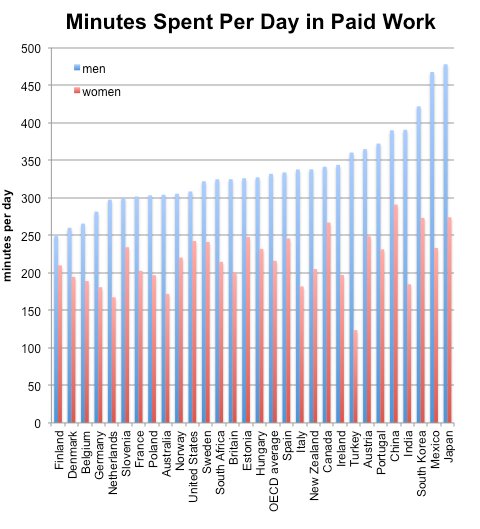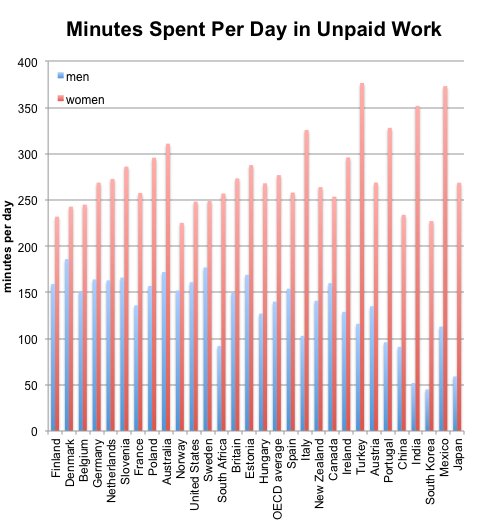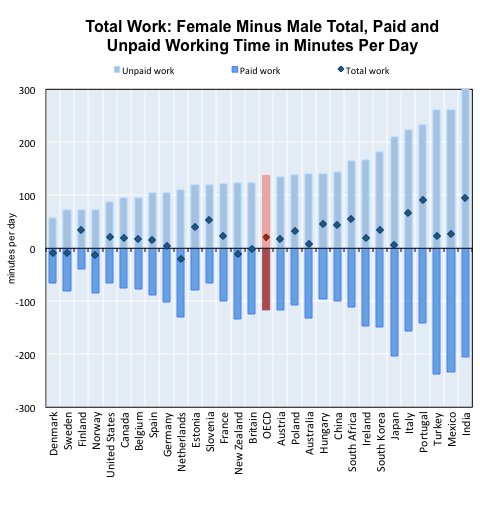
CATHERINE RAMPELL
Dollars to doughnuts.
In most of the developed world, women spend more time working each day than men do, if you include unpaid work.
According to the latest report on gender and employment from the Organization for Economic Cooperation and Development, across the developed world and in other countries tracked by the organization, men spend more minutes per day in paid work than women do.
 The years covered are: Australia: 2006; Austria: 2008-09; Belgium: 2005; Canada: 2010; China: 2008; Denmark: 2001; Estonia: 1999-2000; Finland: 2009-10; France: 1998-99; Germany: 2001-02; Hungary: 1999-2000; India: 1999; Italy: 2002-03; Ireland: 2005; Japan: 2006; South Korea: 2009; Mexico: 2009; the Netherlands: 2006; New Zealand: 2009-10; Norway: 2000-01; Poland: 2003-04; Portugal: 1999; Slovenia: 2000-01; South Africa: 2000; Spain: 2002-03; Sweden: 2000-01; Turkey: 2006; Britain: 2000-01; and the United States: 2010. Source: Organization for Economic Cooperation and Development. Secretariat estimates based on national time-use surveys. Further detail, see: Miranda, V. (2011), “Cooking, Caring and Volunteering: Unpaid Work Around the World”, O.E.C.D. Social, Employment and Migration Working Papers, No. 116, O.E.C.D. Publishing, Paris.
The years covered are: Australia: 2006; Austria: 2008-09; Belgium: 2005; Canada: 2010; China: 2008; Denmark: 2001; Estonia: 1999-2000; Finland: 2009-10; France: 1998-99; Germany: 2001-02; Hungary: 1999-2000; India: 1999; Italy: 2002-03; Ireland: 2005; Japan: 2006; South Korea: 2009; Mexico: 2009; the Netherlands: 2006; New Zealand: 2009-10; Norway: 2000-01; Poland: 2003-04; Portugal: 1999; Slovenia: 2000-01; South Africa: 2000; Spain: 2002-03; Sweden: 2000-01; Turkey: 2006; Britain: 2000-01; and the United States: 2010. Source: Organization for Economic Cooperation and Development. Secretariat estimates based on national time-use surveys. Further detail, see: Miranda, V. (2011), “Cooking, Caring and Volunteering: Unpaid Work Around the World”, O.E.C.D. Social, Employment and Migration Working Papers, No. 116, O.E.C.D. Publishing, Paris.
In the United States, for example, men spend 5 hours and 8 minutes working on the average day, whereas women spend 4 hours and 2 minutes.
But when it comes to unpaid work — activities like child care and cleaning — women spend vastly more time than men in every country the organization included in its analysis.
 The years covered are: Australia: 2006; Austria: 2008-09; Belgium: 2005; Canada: 2010; China: 2008; Denmark: 2001; Estonia: 1999-2000; Finland: 2009-10; France: 1998-99; Germany: 2001-02; Hungary: 1999-2000; India: 1999; Italy: 2002-03; Ireland: 2005; Japan: 2006; South Korea: 2009; Mexico: 2009; the Netherlands: 2006; New Zealand: 2009-10; Norway: 2000-01; Poland: 2003-04; Portugal: 1999; Slovenia: 2000-01; South Africa: 2000; Spain: 2002-03; Sweden: 2000-01; Turkey: 2006; Britain: 2000-01; and the United States: 2010. Source: Organization for Economic Cooperation and Development. Secretariat estimates based on national time-use surveys. Further detail, see: Miranda, V. (2011), “Cooking, Caring and Volunteering: Unpaid Work Around the World”, O.E.C.D. Social, Employment and Migration Working Papers, No. 116, O.E.C.D. Publishing, Paris.
The years covered are: Australia: 2006; Austria: 2008-09; Belgium: 2005; Canada: 2010; China: 2008; Denmark: 2001; Estonia: 1999-2000; Finland: 2009-10; France: 1998-99; Germany: 2001-02; Hungary: 1999-2000; India: 1999; Italy: 2002-03; Ireland: 2005; Japan: 2006; South Korea: 2009; Mexico: 2009; the Netherlands: 2006; New Zealand: 2009-10; Norway: 2000-01; Poland: 2003-04; Portugal: 1999; Slovenia: 2000-01; South Africa: 2000; Spain: 2002-03; Sweden: 2000-01; Turkey: 2006; Britain: 2000-01; and the United States: 2010. Source: Organization for Economic Cooperation and Development. Secretariat estimates based on national time-use surveys. Further detail, see: Miranda, V. (2011), “Cooking, Caring and Volunteering: Unpaid Work Around the World”, O.E.C.D. Social, Employment and Migration Working Papers, No. 116, O.E.C.D. Publishing, Paris.
Women perform a disproportionate share of unpaid work regardless of whether they are employed. In couples where both partners have paid jobs, women spend more than two hours per day in unpaid work, the report says, and that gap “hardly narrows” even when you restrict the sample to couples with both partners working full time. Among couples in which the woman works and the man doesn’t, men do only as much housework as the women, and spend far less time in child care.
The biggest gender gaps in unpaid work, in fact, involve taking care of children: working mothers devote about 50 percent more time to child care than nonworking fathers do.
When you look at time spent in paid and unpaid work together, women edge out men in most countries included in the analysis.
 The years covered are: Australia: 2006; Austria: 2008-09; Belgium: 2005; Canada: 2010; China: 2008; Denmark: 2001; Estonia: 1999-2000; Finland: 2009-10; France: 1998-99; Germany: 2001-02; Hungary: 1999-2000; India: 1999; Italy: 2002-03; Ireland: 2005; Japan: 2006; South Korea: 2009; Mexico: 2009; the Netherlands: 2006; New Zealand: 2009-10; Norway: 2000-01; Poland: 2003-04; Portugal: 1999; Slovenia: 2000-01; South Africa: 2000; Spain: 2002-03; Sweden: 2000-01; Turkey: 2006; Britain: 2000-01; and the United States: 2010. Source: Organization for Economic Cooperation and Development. Secretariat estimates based on national time-use surveys. Further detail, see: Miranda, V. (2011), “Cooking, Caring and Volunteering: Unpaid Work Around the World”, O.E.C.D. Social, Employment and Migration Working Papers, No. 116, O.E.C.D. Publishing, Paris.
The years covered are: Australia: 2006; Austria: 2008-09; Belgium: 2005; Canada: 2010; China: 2008; Denmark: 2001; Estonia: 1999-2000; Finland: 2009-10; France: 1998-99; Germany: 2001-02; Hungary: 1999-2000; India: 1999; Italy: 2002-03; Ireland: 2005; Japan: 2006; South Korea: 2009; Mexico: 2009; the Netherlands: 2006; New Zealand: 2009-10; Norway: 2000-01; Poland: 2003-04; Portugal: 1999; Slovenia: 2000-01; South Africa: 2000; Spain: 2002-03; Sweden: 2000-01; Turkey: 2006; Britain: 2000-01; and the United States: 2010. Source: Organization for Economic Cooperation and Development. Secretariat estimates based on national time-use surveys. Further detail, see: Miranda, V. (2011), “Cooking, Caring and Volunteering: Unpaid Work Around the World”, O.E.C.D. Social, Employment and Migration Working Papers, No. 116, O.E.C.D. Publishing, Paris.
The chart above shows how much more time women spend than men on unpaid work (light blue bars); how much less time women spend than men on paid work (medium blue bars); and how much time over all women spend compared to men on paid and unpaid work combined (dark blue diamonds).
As you can see, across the member countries of the Organization for Economic Cooperation and Development, women spend 21 minutes more time, on average, in total work per day than men do.
The gap is exactly the same in the United States. Of the countries surveyed, the gap is biggest in India, where women spend on average 94 minutes more time than men on total work each day.
In a few countries analyzed, though, men do spend slightly more time than women on total work per day: Denmark, Sweden, Norway, the Netherlands and New Zealand. In Britain and Germany, the two sexes spend almost equal time on total work each day, although the composition of that work falls along traditional gender lines, with men spending more of their time on paid work and women more on unpaid work.
For whatever reason, the traditional division of labor appears deeply ingrained, in both rich countries and poor ones. The report observes also that policies intended to help promote work-life balance, such as parental leave options, often counterintuitively have the effect of reinforcing gender roles at home:
[M]others generally make much wider use than fathers of parental leave options, part-time employment opportunities, and other flexible working time arrangements like teleworking. It is primarily mothers, for example, who avail themselves of long parental leave – and they are frequently reluctant to give up leave to their partner’s benefit. The result is a reinforcement of traditional gender roles. In fact, even when policies allow or encourage women to change the nature of their participation in employment or their hours of work, inequalities at home and in contributions to home life have a tendency to remain. A vicious circle is thus established: as long as mothers reduce employment participation when they have (young) children in the household, employers have an incentive to invest less in their female than in their male workers.
Article source: http://economix.blogs.nytimes.com/2012/12/19/in-most-rich-countries-women-work-more-than-men/?partner=rss&emc=rss